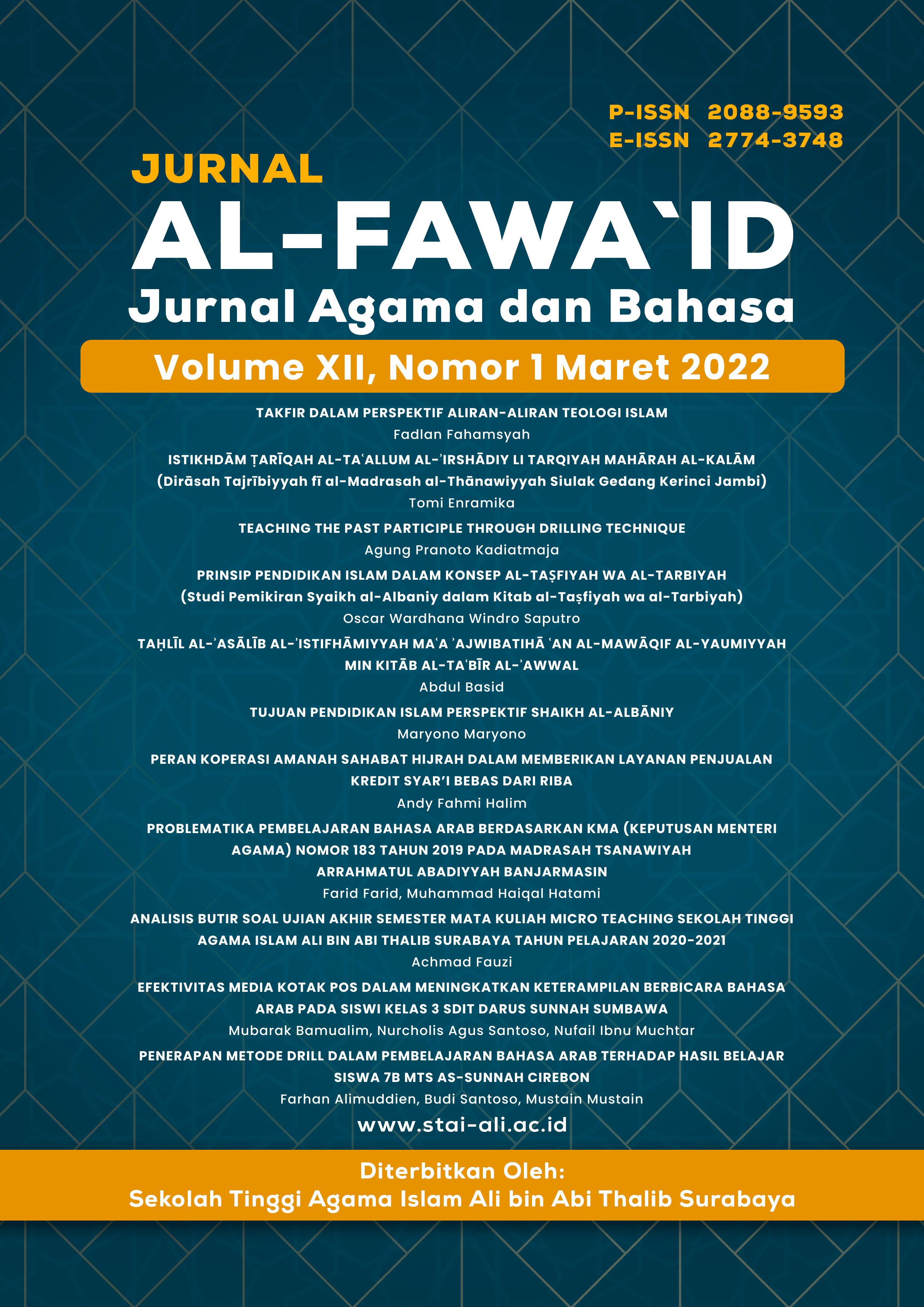PRINSIP PENDIDIKAN ISLAM DALAM KONSEP AL-TAṢFIYAH WA AL-TARBIYAH
(Studi Pemikiran Syaikh al-Albaniy dalam Kitab al-Taṣfiyah wa al-Tarbiyah)
Authors
Oscar Wardhana Windro Saputro
Among the figures of Islamic scholars who always stick to the Qur'an and sunnah, even giving a large portion of attention to both, especially in the field of hadith science is Shaykh Muhammad Nashiruddin al-Albany. Shaykh al-Albany is a scholar who plays a major role in education, especially the development of hadith science. This paper discusses the thoughts of Shaykh al-Albany in the field of Islamic education, especially in the issue of Islamic educational principles contained in his book entitled al-Taṣfiyah wa al-Tarbiyah wa Ḥājah al-Muslimīn ilayhimā. This research is included in library research, while in terms of subjects studied, this research is included in the study of figure thoughts. In this study, the author used documentation techniques that in practice applications are carried out by collecting documents from the work of Shaykh al-Albany and other documents related to this research. From the research that has been done can be concluded as follows: The concept of tashfiyah intended by Shaykh al-Albany, which is purifying science and straightening religious understanding of things that are not part of religion but are suspected part of religion and not in accordance with the basis of Islam, namely the Qur'an and as-Sunnah authentic from the Prophet. The concept of Tarbiyah that is intended by Shaykh al-Albany, which is to educate the younger generation with knowledge and understanding that has been purified from things that are not part of religion, namely knowledge based on the Qur'an and sunnah, so that the solution to regain the glory of Islam can be achieved. The principles of Islamic education developed by Shaykh al-Albany include: the principle of returning to the Qur'an and sunnah, the principle of purification of knowledge and correct understanding, the principle of education of knowledge and practice.
al-ʿAjmy, Muḥammad ʿAbd al-Salām. al-Tarbiyah al-ʾIslāmiyyah al-ʾUṣūl wa al-Taṭbīqāt, Riyadh: Dār al-Nāṣir al-Duwaliy, 2006 M.
al-ʿUmrāniy, ʿAbd al-Ghaniy Muḥammad ʾIsmāʿīl. ʾUṣūl al-Tarbiyah, Shan’a: Dār al-Kitāb al-Jāmiʿiy, 2014 M.
al-ʾAlbāniy, Muḥammad Nāṣir al-Dīn. al-Taṣfiyah wa al-Tarbiyah wa Ḥājah al-Muslimīn ilayhimā. Amman: Maktabah Islamiyyah, 1431 H.
al-Ḥāzimiy, Khālid Ḥāmid. ʾUṣūl al-Tarbiyah al-ʾIslāmiyyah, Madinah: Dār ʿĀlam al-Kutub, 2000 M.
Arikunto, Suharismi. Prosedur Penelitian; Suatu Pendekatan Praktek, Jakarta: Rineka Cipta, 2006 M.
Madkur, ʿAliy ʾAḥmad. Manāhij al-Tarbawiyyah ʾAsāsuhā wa Taṭbīqātuhā, Kairo: Dār al-Fikr al-ʿArabiy, 2001 M.
Moleong, Lexy J. Metode Penelitian Kualitatif, Bandung: Remaja Rosdakarya, 2007 M.
Mursy, Muḥammad Munīr. al-Tarbiyah al-ʾIslāmiyyah ʾUṣūluhā wa Taṭawwuruhā fī al-Bilād al-ʾIslāmiyyah, Dār al-Maʿārif, 1987 M.
Nata, Abuddin. Ilmu Pendidikan Islam, Jakarta: Prenada Media, 2012 M.
Nazir, Mohammad. Metodologi Penelitian, Jakarta: Ghalia Indonesia, 1988 M.
Sugiyono, Metode Penelitian Pendidikan, Bandung: Alfabeta, 2009 M.
Article Sidebar
Copyright (c) 2022 oscar wardhana windro saputro

This work is licensed under a Creative Commons Attribution 4.0 International License.

